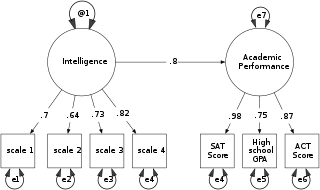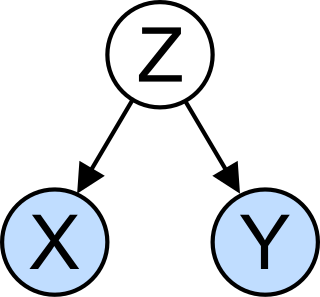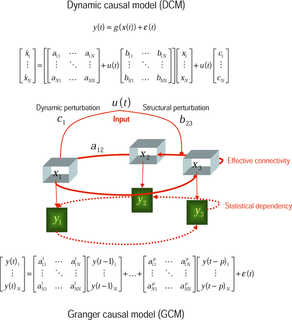Related Research Articles

The design of experiments is the design of any task that aims to describe and explain the variation of information under conditions that are hypothesized to reflect the variation. The term is generally associated with experiments in which the design introduces conditions that directly affect the variation, but may also refer to the design of quasi-experiments, in which natural conditions that influence the variation are selected for observation.
Econometrics is the application of statistical methods to economic data in order to give empirical content to economic relationships. More precisely, it is "the quantitative analysis of actual economic phenomena based on the concurrent development of theory and observation, related by appropriate methods of inference". An introductory economics textbook describes econometrics as allowing economists "to sift through mountains of data to extract simple relationships". Jan Tinbergen is one of the two founding fathers of econometrics. The other, Ragnar Frisch, also coined the term in the sense in which it is used today.
Causality is influence by which one event, process, state, or object contributes to the production of another event, process, state, or object where the cause is partly responsible for the effect, and the effect is partly dependent on the cause. In general, a process has many causes, which are also said to be causal factors for it, and all lie in its past. An effect can in turn be a cause of, or causal factor for, many other effects, which all lie in its future. Some writers have held that causality is metaphysically prior to notions of time and space.
The phrase "correlation does not imply causation" refers to the inability to legitimately deduce a cause-and-effect relationship between two events or variables solely on the basis of an observed association or correlation between them. The idea that "correlation implies causation" is an example of a questionable-cause logical fallacy, in which two events occurring together are taken to have established a cause-and-effect relationship. This fallacy is also known by the Latin phrase cum hoc ergo propter hoc. This differs from the fallacy known as post hoc ergo propter hoc, in which an event following another is seen as a necessary consequence of the former event, and from conflation, the errant merging of two events, ideas, databases, etc., into one.

An experiment is a procedure carried out to support or refute a hypothesis, or determine the efficacy or likelihood of something previously untried. Experiments provide insight into cause-and-effect by demonstrating what outcome occurs when a particular factor is manipulated. Experiments vary greatly in goal and scale but always rely on repeatable procedure and logical analysis of the results. There also exist natural experimental studies.
Validity is the main extent to which a concept, conclusion or measurement is well-founded and likely corresponds accurately to the real world. The word "valid" is derived from the Latin validus, meaning strong. The validity of a measurement tool is the degree to which the tool measures what it claims to measure. Validity is based on the strength of a collection of different types of evidence described in greater detail below.

Quantitative research is a research strategy that focuses on quantifying the collection and analysis of data. It is formed from a deductive approach where emphasis is placed on the testing of theory, shaped by empiricist and positivist philosophies.

In statistics, a spurious relationship or spurious correlation is a mathematical relationship in which two or more events or variables are associated but not causally related, due to either coincidence or the presence of a certain third, unseen factor.
Internal validity is the extent to which a piece of evidence supports a claim about cause and effect, within the context of a particular study. It is one of the most important properties of scientific studies and is an important concept in reasoning about evidence more generally. Internal validity is determined by how well a study can rule out alternative explanations for its findings. It contrasts with external validity, the extent to which results can justify conclusions about other contexts.
External validity is the validity of applying the conclusions of a scientific study outside the context of that study. In other words, it is the extent to which the results of a study can be generalized to and across other situations, people, stimuli, and times. In contrast, internal validity is the validity of conclusions drawn within the context of a particular study. Because general conclusions are almost always a goal in research, external validity is an important property of any study. Mathematical analysis of external validity concerns a determination of whether generalization across heterogeneous populations is feasible, and devising statistical and computational methods that produce valid generalizations.

Structural equation modeling (SEM) is a label for a diverse set of methods used by scientists in both experimental and observational research across the sciences, business, and other fields. It is used most in the social and behavioral sciences. A definition of SEM is difficult without reference to highly technical language, but a good starting place is the name itself.
This glossary of statistics and probability is a list of definitions of terms and concepts used in the mathematical sciences of statistics and probability, their sub-disciplines, and related fields. For additional related terms, see Glossary of mathematics and Glossary of experimental design.

In statistics, a confounder is a variable that influences both the dependent variable and independent variable, causing a spurious association. Confounding is a causal concept, and as such, cannot be described in terms of correlations or associations. The existence of confounders is an important quantitative explanation why correlation does not imply causation.
The goals of experimental finance are to understand human and market behavior in settings relevant to finance. Experiments are synthetic economic environments created by researchers specifically to answer research questions. This might involve, for example, establishing different market settings and environments to observe experimentally and analyze agents' behavior and the resulting characteristics of trading flows, information diffusion and aggregation, price setting mechanism and returns processes.

In fields such as epidemiology, social sciences, psychology and statistics, an observational study draws inferences from a sample to a population where the independent variable is not under the control of the researcher because of ethical concerns or logistical constraints. One common observational study is about the possible effect of a treatment on subjects, where the assignment of subjects into a treated group versus a control group is outside the control of the investigator. This is in contrast with experiments, such as randomized controlled trials, where each subject is randomly assigned to a treated group or a control group. Observational studies, for lacking an assignment mechanism, naturally present difficulties for inferential analysis.

In the philosophy of science, a causal model is a conceptual model that describes the causal mechanisms of a system. Causal models can improve study designs by providing clear rules for deciding which independent variables need to be included/controlled for.
In causal models, controlling for a variable means binning data according to measured values of the variable. This is typically done so that the variable can no longer act as a confounder in, for example, an observational study or experiment.

A quasi-experiment is an empirical interventional study used to estimate the causal impact of an intervention on target population without random assignment. Quasi-experimental research shares similarities with the traditional experimental design or randomized controlled trial, but it specifically lacks the element of random assignment to treatment or control. Instead, quasi-experimental designs typically allow the researcher to control the assignment to the treatment condition, but using some criterion other than random assignment.

Causation refers to the existence of "cause and effect" relationships between multiple variables. Causation presumes that variables, which act in a predictable manner, can produce change in related variables and that this relationship can be deduced through direct and repeated observation. Theories of causation underpin social research as it aims to deduce causal relationships between structural phenomena and individuals and explain these relationships through the application and development of theory. Due to divergence amongst theoretical and methodological approaches, different theories, namely functionalism, all maintain varying conceptions on the nature of causality and causal relationships. Similarly, a multiplicity of causes have led to the distinction between necessary and sufficient causes.
Causal inference is the process of determining the independent, actual effect of a particular phenomenon that is a component of a larger system. The main difference between causal inference and inference of association is that causal inference analyzes the response of an effect variable when a cause of the effect variable is changed. The science of why things occur is called etiology. Causal inference is said to provide the evidence of causality theorized by causal reasoning.
References
- ↑ Brains, C., Willnat, L,, Manheim, J., Rich, R. 2011. Empirical Political Analysis 8th edition. Boston, MA: Longman. p. 76.
- ↑ "Causal research". Business Dictionary. Archived from the original on 9 October 2014. Retrieved 19 October 2014.
- ↑ DJS Research Ltd. "What is Causal Research?". Market Research World. Retrieved 19 October 2014.